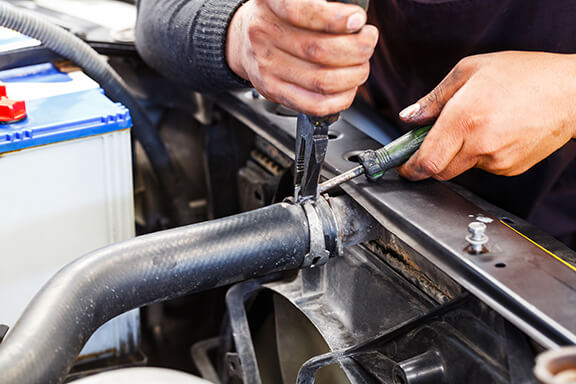Radiator Service San Diego
It is easy to forget about your Radiator as you are driving around the San Diego area. But when there is an issue with it, your car will most definitely let you know. The Radiator is one of three parts that make up your car’s cooling system (Thermostat and Water Pump are the other two). All three of these parts make sure that the 200 degrees your car runs on does not cause your engine to overheat. The Radiator stops overheating by cooling the fluid that flows around the engine block to make the engine heat dissipate. But if there is smoke coming out of the Radiator, it is a sure sign that you have one of the following issues.

Leak
Leaky hoses are the most common cause of radiator leaks, but you may also have leaks in the radiator itself, which can be a bigger issue. The pressure created by the coolant flowing from your radiator to your heavy, running engine and back creates a lot of stress. Your radiator hoses can finally succumb to the pressure buildup from deterioration or just by coming loose. If you see a green liquid under your car, that is a sign that you have a leak.
Rusty Radiator
You will know if the exterior of your car rusts. But just because you aren’t aware of it doesn’t mean it isn’t taking place in your vehicle. As air, metal, and liquid come together, oxidation and rust are inevitable. Since all of those ingredients are present in your radiator, rust is a real possibility. If your radiator becomes too rusted, it can develop holes, leaks, or fail while you are driving around the San Diego area.
Check your radiator for rust if your car is running too hot. On the outside, it should be obvious, but you can also tell if the color of your coolant turns brownish. If you drive your car in cold weather, you should be extra careful to avoid rust.
Gunk
Mineral Deposits, also called Gunk, will accumulate in your radiator over time. It is a thick, unsettling goopy substance that only has one use – to clog everything up! Mineral deposits, by-products, debris, and other obstructive accumulation in your radiator make it difficult for it to flow the correct amount of coolant to the engine. Check inside the radiator for gunk accumulation if your car is overheating or getting hot too quickly and you don’t see any rust, leaks, or hose detachment.
Idle Overheating
Any problem with the cooling system usually results in an overheated radiator or engine. A failed radiator fan is a common culprit if the temperature gauge spikes when you’re stuck in traffic or idling for any other purpose. An electric fan draws air into the radiator to keep it cool when you are idling or driving at low speed, which is a part of your coolant system, particularly if you have a modern car. Idle overheating is a common side effect when this fan fails.
